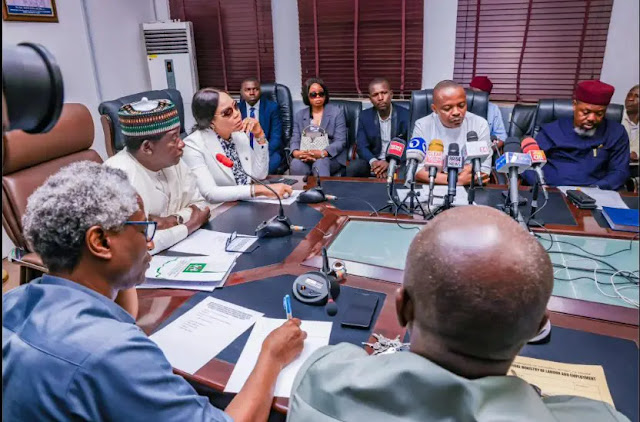After a two-day delay, the negotiations
over the national minimum wage hit another deadlock yesterday. By the end of
the meeting, the Federal Government negotiating team had increased its offer by
N2,000, bringing it to N62,000. In contrast, the Organised Labour reduced its
demand to N250,000, down from N494,000.
Earlier in the day, while negotiations were
ongoing, the state governors declared their inability to pay even the N60,000
minimum wage initially proposed by the Federal Government before it was
increased by N2,000. It was reported that the Organised Private Sector (OPS)
supported the government's offer.
Due to the impasse, the Tripartite
Committee on the New National Minimum Wage (NNMW) has adjourned. A source
stated, "There was a disagreement on the amount. The government offered
N62,000, but Labour is now demanding N250,000. The report will be communicated
to the President for further deliberation."
Before the Federal Government increased its
offer to N62,000 yesterday, the state governors, under the Nigeria Governors
Forum (NGF), had expressed their inability to pay the proposed N60,000 minimum
wage, which the organised labour had already rejected. This stance was taken as
the Tripartite Committee met to finalize the minimum wage negotiations.
The governors argued that the N60,000
minimum wage proposed by the Federal Government was unsustainable. They warned
that if implemented, several states would need to borrow monthly to pay
workers, which they believed was not in the collective interest of the country,
including the workers themselves.
The governors emphasized that sustaining
the proposed N60,000 minimum wage would result in many states using all their
Federation Account Allocation Committee (FAAC) allocations solely for salaries,
leaving nothing for development projects.
This position was articulated in a
statement issued by the NGF's acting Director of Media and Public Affairs,
Hajiya Halimah Salihu Ahmed, titled "The Forum’s Stand on the N60,000
Minimum Wage: Not Sustainable."
The statement read, “The Nigeria Governors’
Forum (NGF) acknowledges the need for a new minimum wage and sympathizes with
labour unions in their pursuit of higher wages. However, the Forum urges all
parties to consider that minimum wage negotiations also involve consequential
adjustments across all cadres, including pensioners. The NGF advises caution
and emphasizes that any agreement should be sustainable and realistic.”
“All things considered, the NGF maintains
that the N60,000 minimum wage proposal is not sustainable. Many states would
spend all their FAAC allocations on salaries, with nothing left for development
purposes. In fact, some states would need to borrow monthly to pay workers.
This is not in the collective interest of the country, including the workers.
We appeal to all parties, especially labour unions, to consider all
socioeconomic variables and settle for an agreement that is sustainable,
durable, and fair to all segments of society with a legitimate claim to public
resources.”
Members of the organised labour, including
the Nigeria Labour Congress and the Trade Union Congress, had suspended their
strike for five days on Tuesday. The strike, which began on Monday, was in
response to the Federal Government's failure to approve a new minimum wage by
May 31 and to reverse the hike in electricity tariffs.
After a six-hour meeting with the
leadership of organised labour in Abuja on Monday night, the Federal Government
reiterated President Bola Tinubu’s commitment to raising the proposed N60,000
minimum wage.
The agreement stated, “The President of
Nigeria, Commander-in-Chief of the Armed Forces, is committed to establishing a
National Minimum Wage higher than N60,000. The Tripartite Committee will
convene daily for the next week to finalize an agreeable National Minimum
Wage.”
The organised labour also agreed to “immediately hold meetings of its organs to consider this new offer, and no worker would face victimization for participating in the industrial action.” These resolutions were signed on behalf of the Federal Government by Minister of Information and National Orientation, Mohammed Idris, and Minister of State for Labour and Employment, Nkeiruka Onyejeocha.









No comments:
Post a Comment